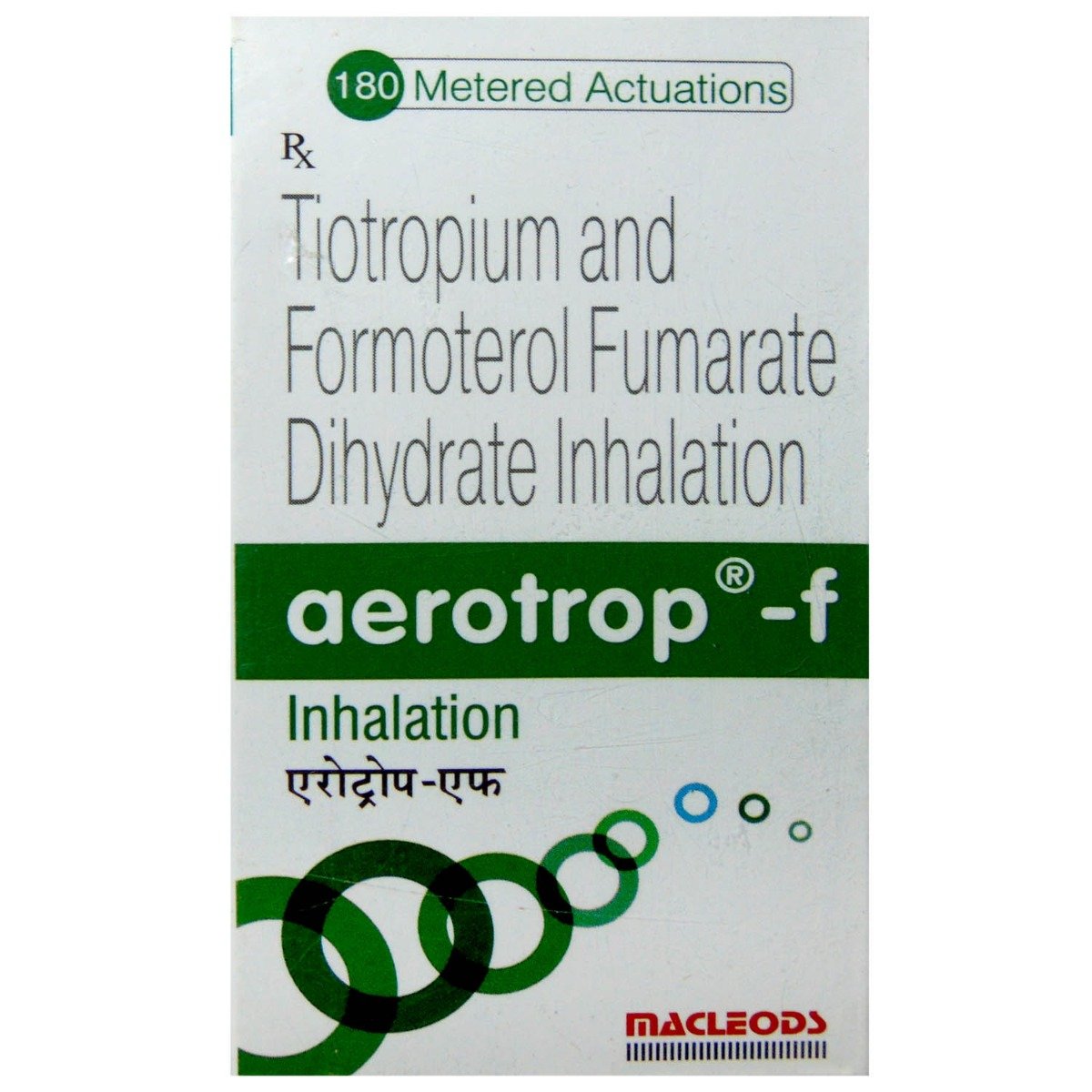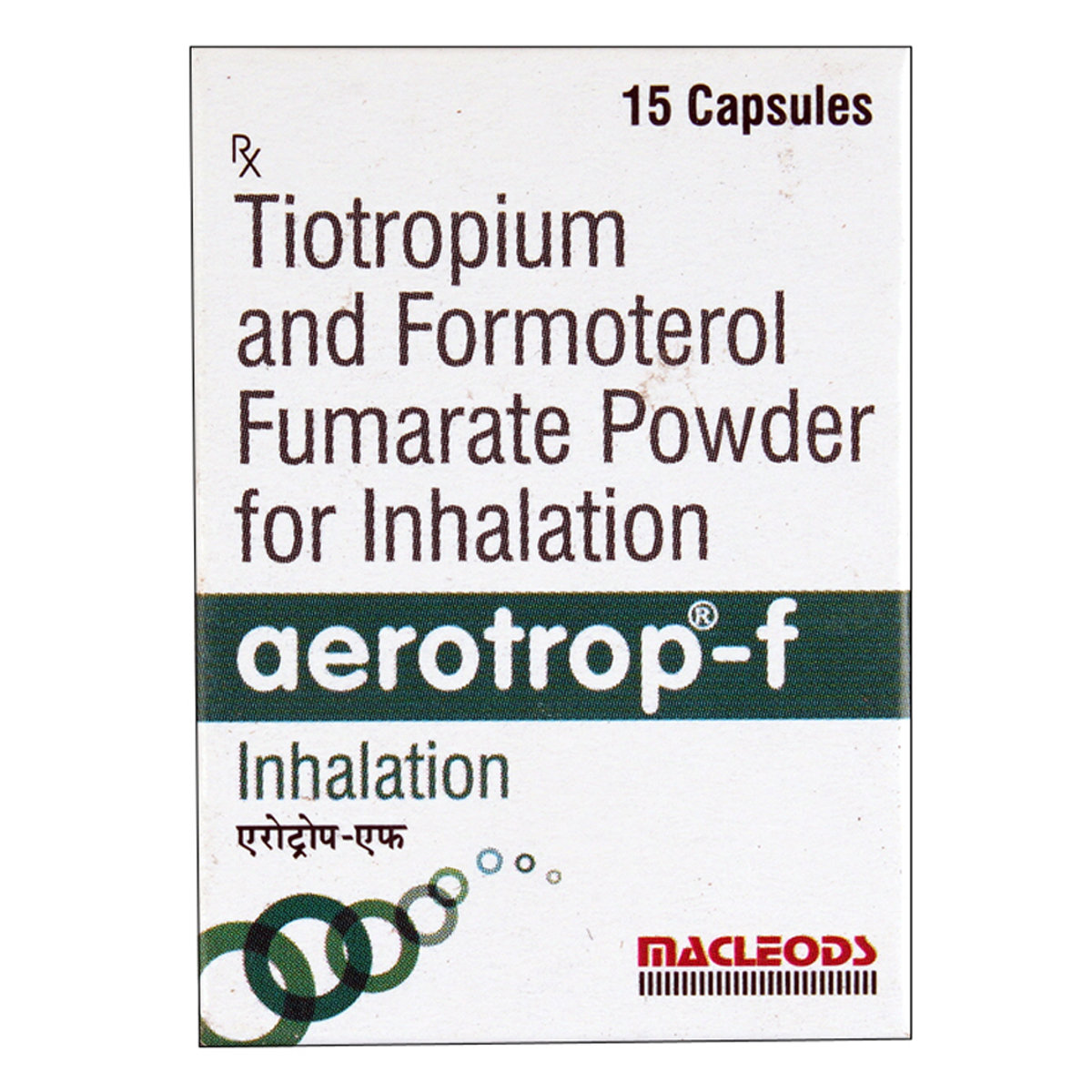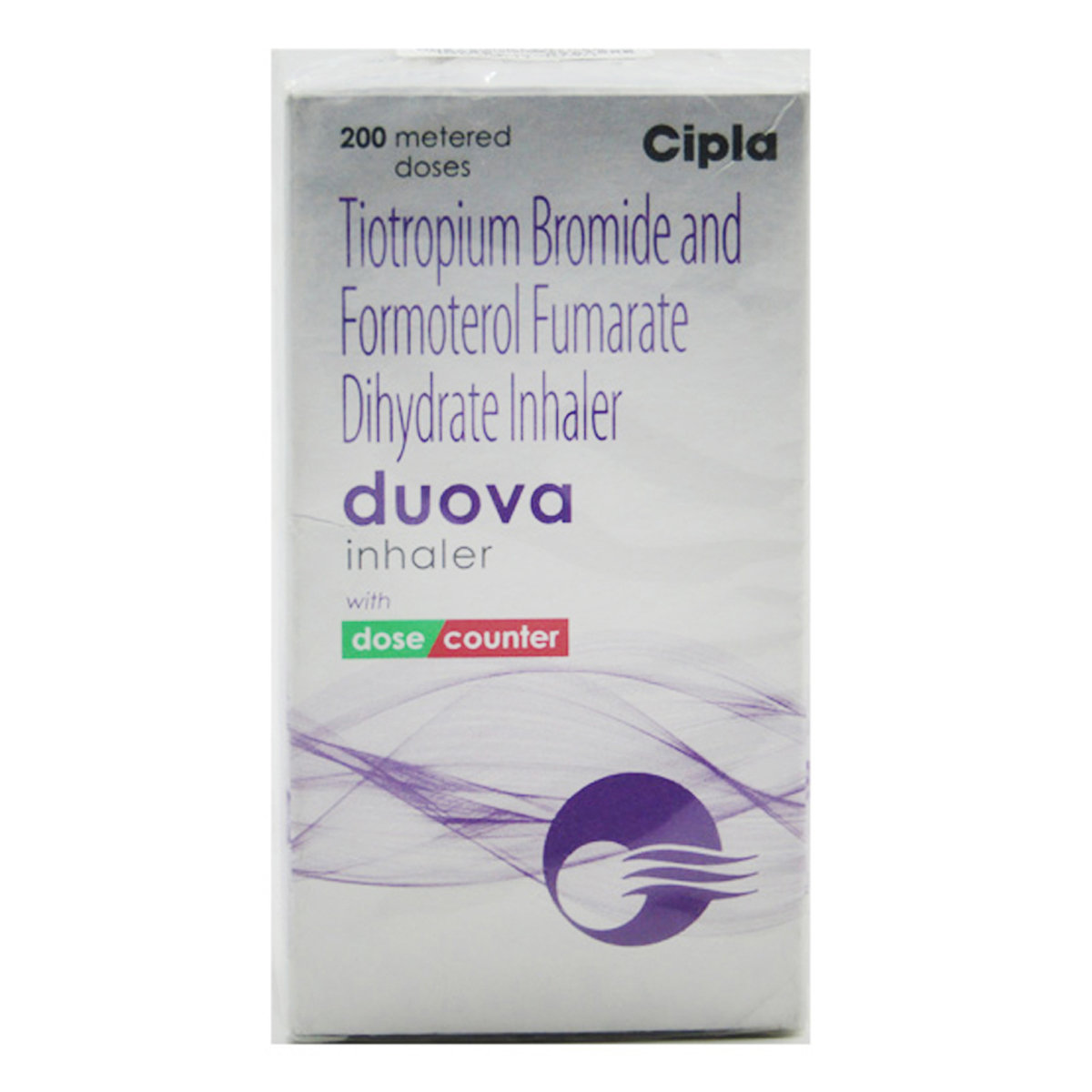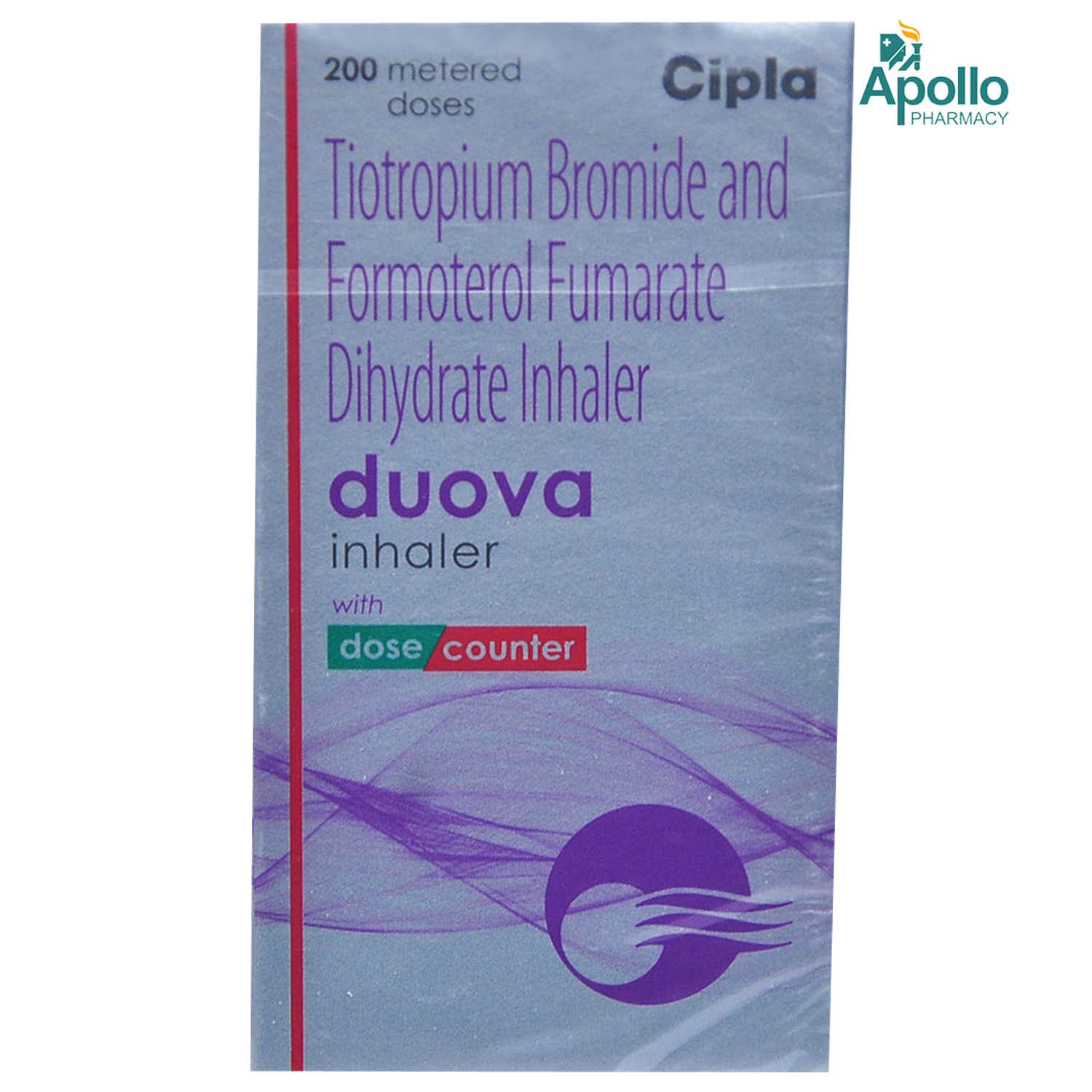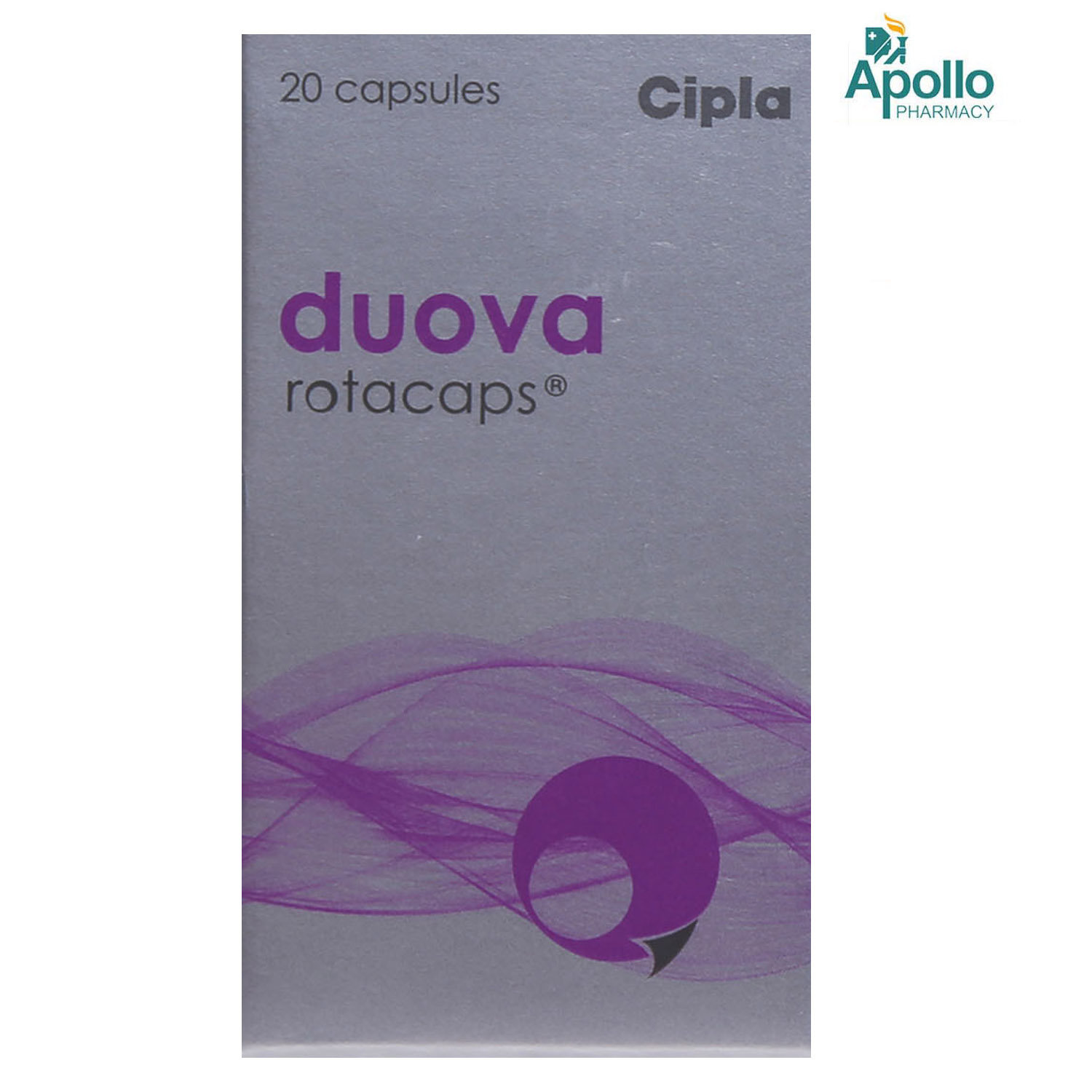Formoterol+tiotropium
About Formoterol+tiotropium
Formoterol+tiotropium is a respiratory medication primarily used to treat and prevent asthma and chronic obstructive pulmonary diseases (COPD) like bronchitis (inflammation of the lining of your bronchial tubes) and emphysema (shortness of breath). Asthma is a chronic (long-term) respiratory condition in which airways narrow, swell and produce extra mucus, leading to difficulty breathing. COPD is a group of lung diseases that causes obstructed airflow from the lungs.
Formoterol+tiotropium is a combination of Formoterol (bronchodilator) and Tiotropium (anticholinergic). Formoterol relaxes the muscles in the airways and increases airflow to the lungs. Formoterol makes breathing easier by widening the airways. Tiotropium works by blocking the receptors for acetylcholine released in the cholinergic nerve endings in the airways. Formoterol+tiotropium relaxes and widens the airway's openings, making it easier for the air to get in and out of the lungs. Thereby, it helps to prevent asthma attacks.
Your doctor will advise on how often you need to use Formoterol+tiotropium based on your medical condition. The common side effects of Formoterol+tiotropium include nausea, vomiting, respiratory tract infection, headache, sore throat, cough, bone, muscle or joint pain, increased heart rate, chills, tiredness, and noisy breathing. Most of these side effects of Formoterol+tiotropium do not require medical attention and gradually resolve over time. However, if the side effects are persistent, reach out to your doctor.
Do not use Formoterol+tiotropium to treat sudden severe symptoms of asthma or as a rescue inhaler. Please check with your doctor if you are pregnant, breastfeeding, or taking other prescribed or non-prescribed medicines. Brief your medical history if you have heart, liver, or kidney diseases, high blood pressure, hypokalaemia (low potassium levels in the blood), aneurysm (swelling of an artery), pheochromocytoma (adrenal gland tumour), hyperadrenocorticism (high levels of cortisol), eye disorders like cataract and glaucoma, chickenpox or measles, immune system problem, seizure (fits), osteoporosis (weak and brittle bones) or diabetes.
Uses of Formoterol+tiotropium
Medicinal Benefits
Formoterol+tiotropium is used to treat and prevent respiratory disorders like asthma and chronic obstructive pulmonary disease (COPD). Formoterol+tiotropium improves pulmonary function and effectively treats and prevents the worsening of emphysema (shortness of breath) and chronic bronchitis (inflammation of the lining of your bronchial tubes). Formoterol+tiotropium contains Formoterol (bronchodilator) and Tiotropium (anticholinergic). Formoterol is a long-acting β₂ agonist and bronchodilator. It relaxes the muscles in the airways and increases airflow to the lungs. It makes breathing easier by widening the airways. Tiotropium works by blocking the receptors for acetylcholine which are released in the cholinergic nerve endings in the airways.
Directions for Use
Storage
Side Effects of Formoterol+tiotropium
- Nausea
- Vomiting
- Respiratory tract infection
- Headache
- Sore throat
- Cough
- Dry mouth
- Constipation
Drug Warnings
Special precautions should be taken in patients with a fungal, bacterial, parasitic, or viral infection and tuberculosis since nasal or inhaled corticosteroids can cause secondary infections. Formoterol+tiotropium can cause a rise in blood glucose levels. Hence monitor your blood glucose levels regularly and inform your doctor if you already have diabetes before using Formoterol+tiotropium. Formoterol+tiotropium may affect the unborn baby during pregnancy. Please let your doctor know if you plan to become pregnant or are already pregnant, or if you are a lactating mother. Formoterol+tiotropium is not recommended for children below five years of age.
Drug Interactions
Drug-Drug Interactions: Formoterol+tiotropium may interact with fluid retention drugs (furosemide), corticosteroids (budesonide, mometasone, beclomethasone), bronchodilators (vilanterol, salmeterol, albuterol), respiratory drugs (ipratropium), drugs treating irregular heartbeat (sotalol), and blood pressure medicines (metoprolol).
Drug-Food Interactions: Limit alcohol intake since it may cause a rise in blood pressure leading to heart diseases.
Drug-Disease Interactions: Inform your doctor if you have any allergic reactions to medicines, heart, liver, kidney diseases, high blood pressure, hypokalaemia (low potassium levels in the blood), aneurysm (swelling of an artery), pheochromocytoma (adrenal gland tumour), hyperadrenocorticism (high levels of cortisol), eye disorders like cataract and glaucoma, chickenpox or measles, immune system problem, seizure (fits), osteoporosis (weak and brittle bones) or diabetes.
Drug-Drug Interactions Checker List:
Safety Advice

Alcohol
unsafeAvoid drinking alcohol while taking this medicine, as it can worsen your side effects.

Pregnancy
unsafeFormoterol+tiotropium is not recommended to use during pregnancy since it may have harmful effects on the unborn baby. Please consult your doctor if you are planning to conceive or are already pregnant before starting Formoterol+tiotropium.

Breast Feeding
cautionIt is not known if this drug passes into breast milk. Consult your doctor before breastfeeding.

Driving
cautionDo not drive or operate machinery if you experience drowsiness and increased/uneven heart rate while using Formoterol+tiotropium. This may affect your ability to drive. Seek medical attention if the symptoms persist longer.

Liver
cautionFormoterol+tiotropium should be used with caution in patients with liver diseases. Let your doctor know if you have any history of liver diseases or hepatic impairment. Your doctor will weigh the benefits and potential risks before prescribing Formoterol+tiotropium.

Kidney
cautionFormoterol+tiotropium should be used with caution in patients with kidney diseases. Let your doctor know if you have any history of kidney diseases. Your doctor will weigh the benefits and potential risks before prescribing Formoterol+tiotropium.

Children
cautionFormoterol+tiotropium is not recommended for use in children less than five years of age. The dose may have to be adjusted by your doctor depending on the condition of the child's disease and age.
Habit Forming
Diet & Lifestyle Advise
- Know your triggers like allergens, such as pollen, dust, and food items that make your asthma severe.
- Quit smoking and avoid passive smoking. Smoking also reduces the effectiveness of the medicine.
- Eat a healthy diet and exercise regularly to strengthen your breathing muscles and boost your immune system.
- Learning breathing exercises will help you move more air in and out of your lungs.
Special Advise
- It is advised to undergo a blood examination to keep a check on your potassium levels since Formoterol+tiotropium can cause low potassium levels in the blood (hypokalaemia).
- Regularly monitor your blood sugar levels while using Formoterol+tiotropium since bronchodilators like Formoterol can cause low blood glucose levels.
- Consult your diabetologist if you have diabetes before using Formoterol+tiotropium so that your insulin or other diabetic medication can be adjusted accordingly to maintain your blood sugar levels.
Patients Concern
Disease/Condition Glossary
Asthma: It is a breathing problem in which airways narrow, swell and produce extra mucus, leading to difficulty breathing.
Chronic obstructive pulmonary disease (COPD): It is a group of lung diseases that block airflow and make breathing difficult. The most common COPD is emphysema and chronic bronchitis.
Emphysema: It is a lung condition that causes shortness of breath.
Chronic Bronchitis: A lung disease associated with inflammation of the lining of bronchial tubes, which carry air to and from the lungs.
FAQs
Formoterol+tiotropium should be cautiously administered under the doctor's guidance in seizures since bronchodilators like Formoterol can cause central nervous system stimulation that can lead to other adverse conditions. Please consult your doctor before using Formoterol+tiotropium if you have seizures.
Formoterol+tiotropium contains bronchodilator, which can cause a rise in blood glucose levels. Hence therapy with Formoterol+tiotropium is cautiously administered in patients with diabetes. Please monitor your blood glucose levels regularly and inform your doctor so the dose can be adjusted accordingly.
Bronchodilator (Formoterol) in Formoterol+tiotropium may decrease the potassium levels in your body, therefore should be used with caution. Please consult your doctor if you have any concerns.
Take the missed dose as soon as possible. However, if it is time for the next dose, skip the missed dose and go back to your regular dosing schedule.
Formoterol in Formoterol+tiotropium may cause dry mouth as a temporary side effect in some people. It is not necessary for everyone taking Formoterol+tiotropium to experience this side effect. However, to avoid such side effects, drink plenty of water, regularly rinse your mouth, practice good oral hygiene and suck on sugarless candy. However, if the condition persists or worsens, please consult a doctor.
Formoterol+tiotropium is not recommended for use when you are taking Sotalol or vice versa. Sotalol and Formoterol+tiotropium have opposing effects on the body. Sotalol may also trigger asthma attacks or worsen your breathing problems by narrowing the airways. Please consult your doctor before using other medicines with Formoterol+tiotropium.
Formoterol+tiotropium is not used for sudden breathing problems; your doctor may suggest a rescue inhaler for sudden breathing problems.

